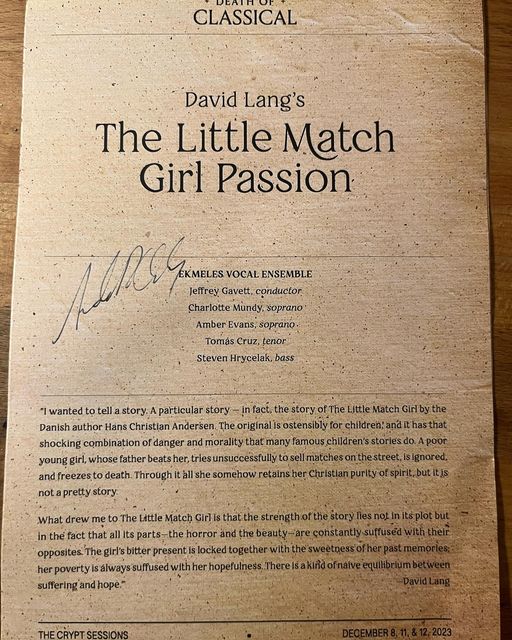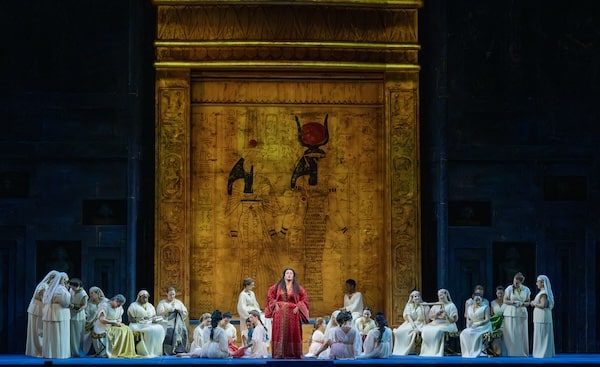New York review: Little Match Girl lights undeground fire
OrchestrasBy Susan Hall, special to Slipped Disc:
David Lang’s Pulitzer Prize-winning Passion opera The Little Match Girl was performed in its original form with four artists both singing and playing instruments at a Crypt.
The audience descends down 40 stairs into a multi-arched burial vault in the basement of the Church of the Intercession in New York. Death of Classical, an innovative music producer that chooses unique locations especially suited to the music performed, presented.
Impresario Andrew Ousley immediately announced that the boiler was not working and we would not have heat. This seems particularly appropriate for a Passion in which an innocent child freezes to death.
‘Tis the season to be jolly, yet even in the bleakest of times, the composer can find humor. He reports that this work grew out of multiple requests that he compose “for a quasi-medieval and pseudo religious, vaguely pleasant to listen to and a cappella work” and created this one.
Not quite so.
Taking up Bach, two of whose five Passions have survived, Lang musicalizes an incipient death and makes both himself and the audience complicit. Bach’s St. Matthew Passion is the specific prompt.
Bach’s work opens and closes with a reference to the Daughters of Zion. Lang choses to refer only to a Daughter. The little match girl is the daughter of a cruel man who beats her so badly that even when she realizes she is dying, she is terrified to return home. This Daughter brackets the ‘opera.’
Lang extends the liturgical appeal to a universal one by setting the text of Hans Christian Andersen’s tale. Movements alternate between sung spoken words of Andersen’s story, which advances the plot and chorales based on Picander’s text for Bach’s Passion, which enable us to reflect. Telling the story while simultaneously commenting on it pulls us into the center of the action. We know from the start that the little match girl will die. The last word of the opening movement–there are 15–is “gone.” This fore-knowledge embeds us in the story.
The matches the little girl clutches in her hands are to be sold on New Year’s Eve. There are no buyers. She lights one or two. They do not warm. Instead they illuminate warm and loving scenes from her short past: a feast at home and pictures of her now dead Grandmother, who she will soon join.
Listening to beautiful tonal centers driven forward by a bass drum beat compulsively moves us. The sense of complicity and the inability to turn away from the unforgiving short, interrupted motifs have made the work increasingly popular across the globe.
Lang does not want us to drop in. Movements are not designed to be extracted. You make a commitment to stay with the work from start to finish, like Arvo Part’s Passio. At the Crypt, it is impossible to avert your gaze or turn off the beautifully resonating sound.
We are witness to the little girl’s dying and unresponsive. The composer is acutely aware of the suffering around him and remarks: “In the Bach Passions, we are not supposed to notice Jesus’ suffering. Living in the world today, if we noticed everyone’s suffering it would be impossible to live.” The countdown is clear and haunting.
The Ekmeles vocal ensemble sang, spoke and also performed on various percussion instruments. For the beats: the brake drum and the bass drum. For chiming: sleigh bells, glockenspiel, tubular chimes, crotales. This Ensemble group are the first American artists to have received an Ernst von Siemens award. Their lovely voices resonate in the stone-arched setting of the Crypt.
The evening’s experience is harrowing, yet also rewarding as the audience is drawn in. The vocal parts fade at the end. Says Lang: “Just the skeleton of their voices…a kind of ghostly, abstracted community…a really beautiful idea.”
The relentless progression of this Passion is emotionally urgent. This is a Human Passion.
.







As part of my work, I have heard this piece about 8-9 times. It’s garbage and is ill crafted. The Emperor’s New Clothing. Audiences feel let down and dunned with the subject matter. From the brain of a disturbed and shove it up your ass gayboy.
That seemed like a believable assessment until that last sentence.
Unfortunate finally sentence in an otherwise accurate summation of Lang. The guy is a tool. He coached an ensemble I played with a while back and was quite obnoxious. I’m not joking, he actually compared his music to Mozart.
I like the idea of selecting unique locations especially suited to the music being performed.